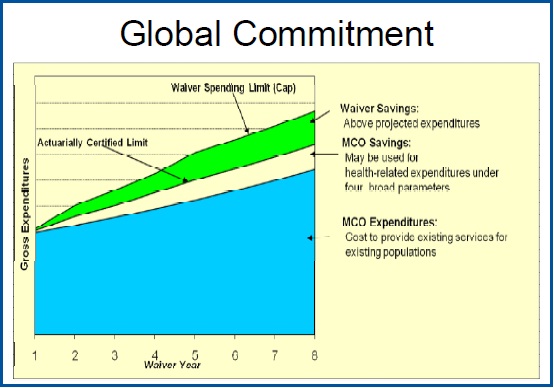Innovative Models for Public Health: Examples of Global Budgets in Action
Blue Cross Blue Shield of Massachusetts Global Payment Plan
In 2009, BCBS of Massachusetts began a modified global payment plan, establishing a fixed cost for the care of patients during a specified time frame and included bonus incentives for achieving quality goals.
According to a 2012 study in Health Affairs, health spending for patients covered by this program was 1.9 percent lower in the first year and 3.3 percent lower in the second year than for patients covered via fee-for-service programs, and the 4,800 doctors in the global payment program also scored higher on measures of quality care. The study found many doctors took cost-cutting steps such as switching to less-expensive lab companies or extending their office hours to cut down on their patients’ emergency room needs.
In August 2012, Massachusetts passed a law aimed at controlling health care costs, which included replacing traditional fee-for-service payments for providers with alternative models, such as global budgeting. Some policymakers in the state project the law could lead to $200 billion in health care savings over the next 15 years.
The global payment approach is bolstered by community-focused prevention and public health programs, which supported the BCBS beneficiaries and other Massachusetts residents.
In 2012, the state was also the first in the nation to pass its own Prevention Fund to help reduce obesity, tobacco use and other high-impact health problems in the state.
Oregon Medicaid Global Budget Approved 2012
In 2012, Oregon received a waiver from CMS for a risk-adjusted global budget for the state’s Medicaid program as part of instituting Coordinated Care Organizations (CCOs) throughout the state.
Their approach is grounded in the idea that “better health = lower costs.” Currently, 16 percent of Oregonians receive support from Medicaid and/or the CHIP services and 11 percent of the state’s overall budget goes toward Medicaid/CHIP.
The new approach will focus on coordinated care, including increased recognition of the need to support health improvement both inside and outside the doctor’s office. The global resources will help allow for increased support for proven community prevention efforts to help improve the overall health of the community, which in turn helps bring down overall costs.
Recent Advances in Global Budgeting
Some recent advances have made global budgets easier to implement than they have been in the past for small, medium-sized and large provider networks, including:
- Electronic health records help give providers increased, accessible information about their patients to deliver better coordinated care and track the population health outcomes of their patients and their communities;
- Integrated management systems give providers increased information about the range of potential services and programs that can help their patients, including how to connect them with services and programs that can provide support to manage their health concerns in their daily lives;
- Integrated billing systems help with the administration of global budgets and linking payment to care; and
- Risk adjustment strategies have been developed so the health status of the patient pool is factored into the payment levels, which mitigates against denying coverage or exclusion of less healthy patients.
Improving the health of the community — or insurance pool — is one key to the success of global health budgets.
Vermont Global Budget
In FY 2006, Vermont began a five-year “Global Commitment to Health” demonstration agreement (which has been extended until the end of 2013) with the federal government to test the impact of a federal funding cap on Medicaid spending to give the state increased flexibility to manage Medicaid health services.
The state pursued this approach to help improve cost containment and expand coverage to the uninsured — approximately one in four Vermonters receives some form of Medicaid assistance. Vermont has been receiving monthly payments to cover the needs of all Medicaid beneficiaries.
The state has a longer-term goal of having a set global health budget for all Vermonters, including those covered by public and private insurance. Currently, Green Mountain Care serves as a hub for low- or no-cost insurance options in the state.

Independent actuaries determined the global budget pool for the state, and if the state was able to control spending under the agreed upon cap, it could keep the difference, but if it exceeded the agreed upon cap, the state would absorb the difference.
The state was able to keep spending significantly below the agreed upon amount, and also invested some of these funds to help improve the health of the population, which in turn helps limit their health care needs, further reducing costs.
The Global Commitment to Health program has helped provide support for public health approaches to improve the health status and quality of life beyond the doctor’s office. Some programs of community investments include: school health services, a strategic blueprint for health in the state, Vermont Information Technology Leaders (VITL), tobacco cessation program support, community mental health services, nontraditional programs like respite services, and increases support for the Women, Infant, & Children (WIC) program.
Access a PDF of this example here.







 ShareThis
ShareThis